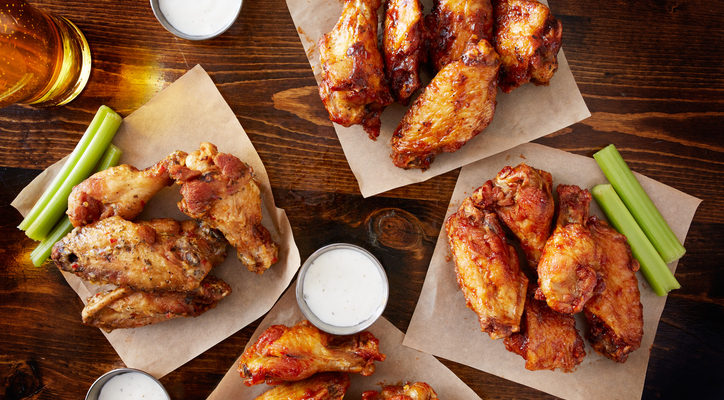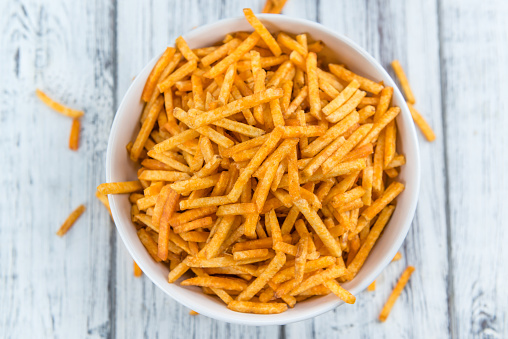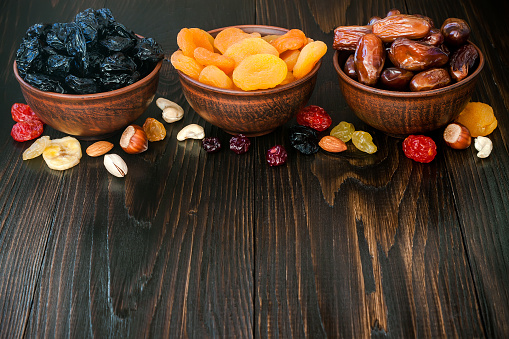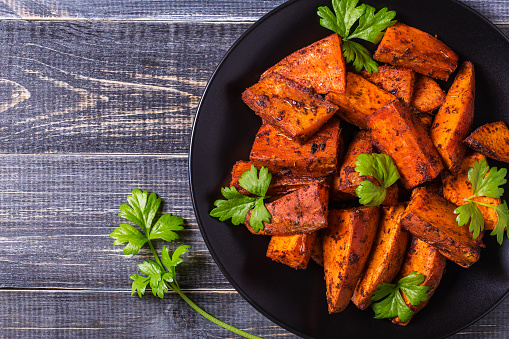Do you and all your best intentions to lose weight say “TGIF!” the day before the weekend starts?
Weekend weight gain is a real thing—and you know it. You get a grim reminder every Monday. If you still don’t believe it: Researchers at Cornell found that the majority of people weigh more on Sunday and Monday than they did on Friday.
What’s going on every weekend?
1. You’re eating more.
A 2003 study published in Obesity Research found that adults eat 118 more calories a day on weekend days than they do on during the week. While that doesn’t sound like much, if you’re not working it off or “paying” for it by following your smart, healthy diet during the week, it can quickly become excess poundage.
Solution: If you can’t curb your indulgences, get right back on the wagon once Monday rolls around. In the Cornell study, those who ate more during the weekend but who got back to the business of losing weight come Monday didn’t gain weight.
Lose Weight By Monday with These 6 Weekend Habits
Read More 
2. You’re eating more fatty foods.
That’s one reason people in the 2003 Obesity Research study racked up more weekend calories. Fatty foods contain more calories per gram than other foods. It has more than twice as many calories as carbohydrates and protein, so it takes many fewer servings of fatty foods to become body fat. In other words, it’s not the pizza crust, it’s the cheese.
Solution: You don’t have to give up pizza, mac and cheese, or juicy steaks. After all, eating low-fat foods isn’t the miracle cure for weight gain. It’s all about the extra calories. So have your favorite foods, but in moderation. For example, one slice of regular thin-crust cheese pizza from a popular pizza chain is 215 calories. Not so bad. But if you eat three, you’ve consumed 645 calories which may well be more than half the calories you’re eating every day during the week to continue dropping pounds. Many pizza chains—in fact, most restaurants—also offer salad. Order one and eat it before the pizza arrives. Studies from Penn State University have found that you’re less likely to overeat if you consume a salad before your meal.
3. You’re eating out more.
It’s great to get some time off from kitchen duty. But restaurants, fast and otherwise, are a minefield for dieters. That includes takeout. In fact, studies that look at how restaurant eating affects weight look at all “food prepared away from home.” And it doesn’t look good. People who eat out the most are heavier than those who eat out the least. They’re also less likely to eat healthy fruits and vegetables, says a 2016 study by researchers at Cornell University and University of Washington.
Solution: Absolutely give yourself a day off from cooking. And enjoy a nice night out with your partner or family. But choose your restaurant and menu choices wisely. Check out your Nutrisystem Eating Out Guide, which contains tips for making that meal out not a diet killer and a list of popular restaurants that offer healthy choices. For example, choose your meal while you’re at home, using the online menus that contain nutritional information (including fat and calories). Watch portions: Ask for a to-go box with your meal and don’t finish it if it’s too large. Be realistic: Don’t order the nachos or fries if you know you can’t resist eating them all. And wave off the bread basket.
Going Out to Dinner? 6 Restaurant Calorie Bombs You Need to Skip
Read More 
4. You’re drinking.
Research has been largely inconclusive about the role alcohol in weight gain. In general, light to moderate drinking doesn’t seem to raise the risk for most, but not all people. But alcohol can pose a problem because research has found that it can stimulate the appetite—something most people on weight loss diets really don’t need. Drinking even one glass of wine, a mixed drink, or beer may suppress the activity of the hormone leptin, which tells your body that you’re full, according to a 2015 study published in the journal, Current Obesity Reports. It may also influence a number of other body processes that affect hunger.
Solutions: Know thyself. Have you experienced increased hunger after drinking alcohol? Then maybe you should avoid it for the duration. If you don’t have a problem, stick to one alcoholic drink a day over the weekend. Remember, your body doesn’t seem to register liquid calories. One 12-ounce beer is 153 calories; a light beer, 103 calories; glass of red wine, 125 calories; glass of white wine, 121 calories; a regular martini, 124 calories; a Cosmopolitan, 146 calories; a margarita, 168 calories.
4. You’re giving yourself a “free pass” for the weekend.
There’s nothing inherently wrong with indulging yourself every once in a while. But it can become a bigger issue if you can’t turn off your “free pass” on Monday. Your weekend binge can become a gateway drug to continued overindulgence and derail all your hard work in losing weight.
Solutions: Plan ahead for your food festival. Decide what foods you really, really want to eat and have sensible portions. Pay attention to what you’re eating too. One 2013 study published in the American Journal of Clinical Nutrition found evidence that eating while distracted can make you eat more, while being attentive to your food—eating slowly and savoring it—can help you remember what you ate which can curb your appetite later.
The Truth About Cheat Days
Read More 
5. Your exercise routine is off.
You may be a faithful walker, runner, jogger, or gym goer during the work week, but become a couch potato once Friday night starts. Or, you may try to cram all your exercise hours into two days, which can make you more prone to injury which can sideline you. While it’s important to vary your exercise routines to beat boredom and avoid plateaus, according to the American Council on Exercise, it’s just as vital to maintain consistency. Adults need at least 150 minutes of exercise a week with total body strength training on two or more days a week, says the Centers for Disease Control and Prevention.
Solutions: Create an activity plan and stick to it. If it suits your schedule better, break up your exercise into short spurts—even 10 minutes a few times a day—over the course of the day. The weekend is a great time to develop a lifetime sport that you enjoy, like tennis, golf, swimming, even kayaking. If you love it, it’s not work. If you’re a parent, help inspire your kids by going on family hikes or playing backyard games like badminton, bocce, tag, or softball.
6. You sleep too much—or too little.
Scientists have been exploring the link between sleep and weight gain for years. One of the most persuasive studies was the Nurse’s Healthy Study which followed 68,000 middle-aged women for more than 15 years. The women who slept five hours or less were 15 percent more likely to become obese compared to those who slept 7 hours or more. One reason: sleep deprivation can lead to an increase in the amount of appetite-boosting chemicals your body produces, according to a study done at the University of Chicago and published in 2004 in the Annals of Internal Medicine. There’s also some evidence that getting too much sleep may also boost weight. A study by the National Sleep Foundation have found that most people sleep about 40 minutes more on the weekends (and about 7 and a half hours on weeknights), though there’s no evidence linking 40 extra minutes of Zzzs leads to weight gain.
Solutions: Get up and go to bed as close to the same time as possible. It helps set your internal clock which will help you fall asleep and wake up more easily, according to the Harvard Medical School Guide to a Good Night’s Sleep. If you have a late night, don’t overdo it. Keep it to 20-30 minutes to feel rested and alert, but not so alert that you can’t go to sleep at night, says the National Sleep Foundation.
10 Ways Sleep Deprivation Affects Your Health
Read More 
7. You overbook yourself.
Weekends are for relaxing, not for keep your stress level at workday intensity. Even if you’re doing fun things, scheduling too much on the weekends can make even fun seem like work. You don’t need any more stress. Studies have found that persistent stress can make us overeat, largely foods high in fat and sugar. That’s because the stress hormone cortisol increases appetite and even the motivation to eat, say experts at Harvard.
Solutions: Be judicious about what you sign up for over the weekend. Make sure to schedule some total relaxation time for you, whether that’s getting a massage, meditating, doing yoga, playing a musical instrument, painting, going to the movies, or even taking long walks with your favorite person (or dog). Pick something that makes you feel relaxed and at peace. Learn to say no to other people and yes to yourself.
The post 7 Weekend Weight Loss Blunders to Avoid appeared first on The Leaf.
from The Leaf http://bit.ly/2JptVRc






